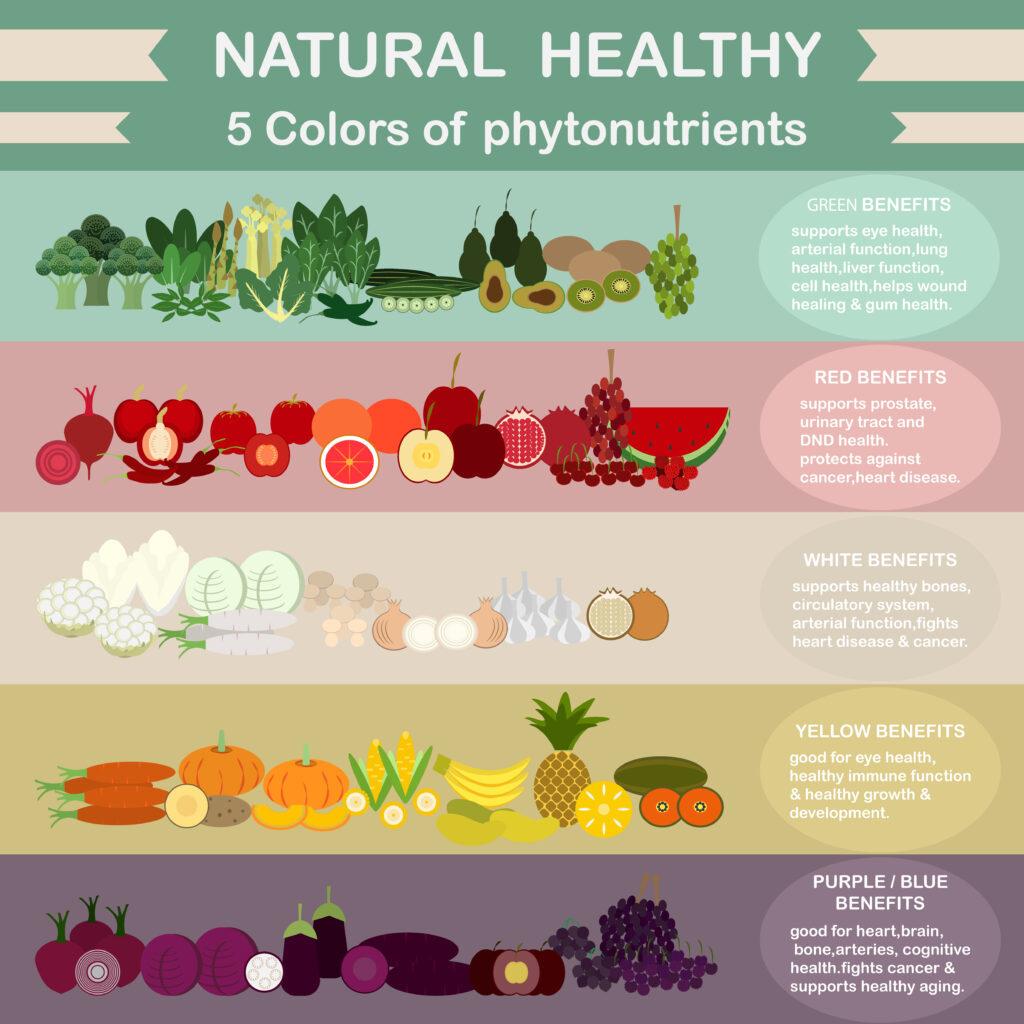In a world where kale reigns supreme and broccoli wears the crown, it’s time we unveil the true power of plant-based diets! Welcome to a realm teeming with vibrant colors, bursting flavors, and the secret weapons known as phytonutrients and fiber. Brace yourself for an illuminating journey through the leafy greens and succulent fruits, as we uncover the extraordinary benefits they hold for our health and well-being. With our feet firmly planted, let’s dig deep into the soil of knowledge and discover how these delightful plant-powered diets can revolutionize our lives.
Phytonutrients: Unlocking the Power of Plant-Based Foods
When it comes to maintaining a healthy and balanced diet, plant-based foods have become increasingly popular. Not only are they known for their rich flavors and vibrant colors, but they also offer a range of powerful compounds called phytonutrients and essential dietary fiber that can greatly benefit our well-being.
Phytonutrients, also known as phytochemicals, are naturally occurring compounds found in plants. These substances are responsible for the unique taste, color, and smell of many fruits and vegetables. But their benefits go beyond aesthetics. Phytonutrients possess powerful antioxidant and anti-inflammatory properties that can boost our immune system, protect against chronic diseases, and even support healthy aging.
One key group of phytonutrients is flavonoids. These compounds are widely present in various plant-based foods, such as berries, citrus fruits, and dark leafy greens. Flavonoids have been linked to a reduced risk of heart disease, improved cognitive function, and enhanced eye health.
In addition to phytonutrients, plant-based foods are also packed with dietary fiber. Fiber is crucial for our digestion and overall gut health. Including an adequate amount of fiber in our diets can help regulate bowel movements, prevent constipation, and even reduce the risk of developing certain types of cancer.
Some excellent sources of dietary fiber include whole grains, legumes, fruits, and vegetables. By incorporating these foods into our meals, we can experience improved satiety, maintain a healthy weight, and promote a well-functioning digestive system.
| Plant-Based Foods | Phytonutrient Content |
|---|---|
| Blueberries | Anthocyanins |
| Citrus Fruits | Flavonoids, Vitamin C |
| Kale | Lutein, Zeaxanthin |
| Broccoli | Sulforaphane |
| Beans | Phytosterols, Isoflavones |

The Role of Fiber in a Healthy Plant-Powered Diet
One of the key elements in a plant-powered diet is the inclusion of plenty of fiber. Fiber is a type of carbohydrate that is essential for maintaining a healthy digestive system and overall wellness. It is found in many plant-based foods such as fruits, vegetables, whole grains, legumes, and nuts.
Fiber offers a multitude of benefits for those following a plant-powered lifestyle. Firstly, it helps to regulate digestion and prevent constipation. This is because fiber adds bulk to your stool, making it easier to pass through your digestive system. Additionally, a diet high in fiber can also help to reduce the risk of developing certain chronic diseases, such as heart disease, diabetes, and certain types of cancer. By promoting a healthy weight and blood sugar levels, fiber is an invaluable component of a plant-powered diet.
There are two types of dietary fiber: soluble and insoluble. Both types are important for maintaining optimal health. Soluble fiber, found in foods such as oats, beans, and citrus fruits, can help to lower cholesterol levels and stabilize blood sugar levels. On the other hand, insoluble fiber, found in vegetables and whole grains, adds bulk to stool and promotes regular bowel movements. Including a variety of fiber-rich foods in your plant-powered diet ensures that you can reap the benefits of both types of fiber.

Harnessing the Health Benefits of Phytonutrients and Fiber
Plant-powered diets offer a plethora of health benefits, thanks to the abundance of phytonutrients and fiber found in fruits, vegetables, whole grains, and legumes. Phytonutrients are natural compounds produced by plants that support their growth and development. When consumed by humans, they act as powerful antioxidants, reducing inflammation and protecting against chronic diseases.
Fiber, on the other hand, is a type of carbohydrate that our bodies cannot fully digest. It plays a crucial role in maintaining a healthy digestive system, promoting regular bowel movements, and preventing constipation. Additionally, fiber helps control blood sugar levels, lower cholesterol levels, and maintain a healthy weight. By including a variety of plant-based foods in our diets, we can harness the incredible health benefits of these two essential components.
The Benefits of Phytonutrients:
- Reduce inflammation in the body.
- Support the immune system and fight off infections.
- Promote healthy aging and cognitive function.
- Protect against certain types of cancer.
- Improve heart health and reduce the risk of cardiovascular diseases.
The Benefits of Fiber:
- Aids in digestion and prevents constipation.
- Helps maintain a healthy weight by promoting satiety.
- Controls blood sugar levels and reduces the risk of type 2 diabetes.
- Lowers cholesterol levels and improves heart health.
- Supports a healthy gut microbiome.
| Food | Phytonutrient |
|---|---|
| Blueberries | Anthocyanins |
| Kale | Lutein |
| Tomatoes | Lycopene |
| Spinach | Flavonoids |
By incorporating an array of colorful fruits and vegetables into your daily meals, you can maximize your intake of phytonutrients and fiber. Remember, variety is key! Experiment with different plant-based recipes and explore new produce options to reap the full spectrum of health benefits that nature has to offer.

Optimizing Your Plant-Powered Diet: Practical Tips and Recommendations
A plant-powered diet, rich in phytonutrients and fiber, can provide numerous benefits for your health and well-being. Phytonutrients are natural compounds found in plants that have been shown to have antioxidant, anti-inflammatory, and immune-boosting properties. These powerful substances can help protect against chronic diseases such as cancer, heart disease, and diabetes. By incorporating a variety of colorful fruits, vegetables, whole grains, and legumes into your meals, you can ensure that you are getting a wide range of phytonutrients to support optimal health.
In addition to phytonutrients, plant-based foods are also abundant in dietary fiber, which plays a crucial role in digestive health. Fiber promotes regular bowel movements, prevents constipation, and helps maintain a healthy weight. It also helps control blood sugar levels, reduces cholesterol levels, and lowers the risk of certain types of cancer. Including fiber-rich foods like beans, lentils, whole grains, and fruits and vegetables with their skin on, can help you meet your daily fiber needs and reap the many benefits it offers.
In Retrospect
In a world often dominated by fad diets and quick fixes, sometimes it’s refreshing to return to the roots of our nutrition. Plant-powered diets offer us a window into the bountiful benefits that nature has to offer, with two key players stealing the spotlight – phytonutrients and fiber. As we bid farewell to this exploration of their incredible powers, let us reflect on the remarkable journey we’ve embarked upon.
With each bite of vibrant fruits and vegetables, we unlock a treasury of phytonutrients. These magnificent bioactive compounds, hidden away in nature’s colorful palette, hold the key to fortifying our health and immunity. From the captivating hues of leafy greens to the fiery glow of berries, phytonutrients guard and nourish our bodies at a cellular level, fighting off disease and promoting longevity. As if crafting a symphony within, they harmoniously tune our bodily systems, reducing inflammation, regulating blood pressure, and bolstering our resilience from within.
But the plants’ generosity does not end there. Fiber steps up on the stage, ready to perform its miraculous act of digestive prowess. With every crunchy bite, a delicate dance begins, as fiber gently sweeps away toxins, nurtures our gut microbiome, and keeps our digestion as smooth as a well-oiled machine. Cholesterol levels dance downwards and blood sugar levels find equilibrium, thanks to this unsung hero. Surpassing its humble reputation, fiber effortlessly assists our weight management goals, leaving us satiated and satisfied.
So, as we conclude this captivating tale of plant-powered diets, we encourage you to look beyond mere sustenance and embrace nature’s abundant wonders. Let the symphony of phytonutrients enrich your plate, and the playful fiber choreograph your daily digestive rhythm. Nourishing your body need not be complicated nor costly – the answers lie within our green friends, waiting to be explored and celebrated. Unlock your health’s true potential, one plant-powered meal at a time. Farewell, but remember: the garden of wellness blooms eternally for those who dare to embrace its enchanting secrets.


